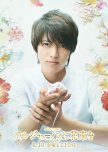Cette critique peut contenir des spoilers
To be dumber for a day or To be smarter for a day
Which would you choose?
Obviously, I would guess that the majority would have chosen the latter...
but, what if you had to sacrifice something important, something precious for it... are you still willing to take a risk?
Everyone wants to be smarter, it's normal. But what happens when you become too immersed in accumulating knowledge?
Sooner or later, you start to neglect the people around you, just as depicted in the show.
An epiphany, where you begin to think you have risen beyond human comprehension.
In the show, Sakuto was born a fool, and everyone treated him that way. But just like everyone else, he had a goal; something he wanted to achieve. Some might say that his goal is impossible for someone like him, and under normal circumstances, it would be the truth. But the show tells us what happens when a chance, a miracle is given to him, allowing this dream of his, to come true. While he's getting smarter, he's also losing something that he has yet to realize or come to understand: his emotions. Rather than seeing things from the fools point-of-view like he used to, he's come to realize that his so-called "friends" were just using him. He begins to see the people close to him for who they really are and not what he perceives them as.
To become smarter is something that we all would want. But what we fail to realize, is that depending on how we use that accumulated knowledge, it is nothing but a double-edged blade.
But, the previous Sakuto had something important, something that even some people do not have: his pureness.
Because he sees the world in the eyes of a kid, he does not have the negative emotions that we teenagers, adults, and elderly, have experienced. And even if he does experience those emotions, he doesn't suppress nor repress them, rather, he cries, just like a kid.
This show taught me that: if you do not know something, then you don't have to worry about it.
Just like the foolish Sakuto, he didn't know anything, therefore, he didn't have to worry about anything.
Which would you choose?
Obviously, I would guess that the majority would have chosen the latter...
but, what if you had to sacrifice something important, something precious for it... are you still willing to take a risk?
Everyone wants to be smarter, it's normal. But what happens when you become too immersed in accumulating knowledge?
Sooner or later, you start to neglect the people around you, just as depicted in the show.
An epiphany, where you begin to think you have risen beyond human comprehension.
In the show, Sakuto was born a fool, and everyone treated him that way. But just like everyone else, he had a goal; something he wanted to achieve. Some might say that his goal is impossible for someone like him, and under normal circumstances, it would be the truth. But the show tells us what happens when a chance, a miracle is given to him, allowing this dream of his, to come true. While he's getting smarter, he's also losing something that he has yet to realize or come to understand: his emotions. Rather than seeing things from the fools point-of-view like he used to, he's come to realize that his so-called "friends" were just using him. He begins to see the people close to him for who they really are and not what he perceives them as.
To become smarter is something that we all would want. But what we fail to realize, is that depending on how we use that accumulated knowledge, it is nothing but a double-edged blade.
But, the previous Sakuto had something important, something that even some people do not have: his pureness.
Because he sees the world in the eyes of a kid, he does not have the negative emotions that we teenagers, adults, and elderly, have experienced. And even if he does experience those emotions, he doesn't suppress nor repress them, rather, he cries, just like a kid.
This show taught me that: if you do not know something, then you don't have to worry about it.
Just like the foolish Sakuto, he didn't know anything, therefore, he didn't have to worry about anything.
Cet avis était-il utile?



